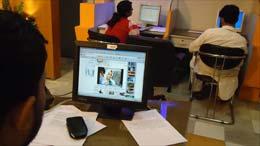Netsweeper takes a byte out of Pakistan’s internet

Shadowy government officials in Pakistan are using Canadian software to block millions of websites and stifle free cyber-debates that the South Asian nation deems undesirable.
The censorship helps shape the views of 180 million Pakistanis on militancy, democracy and religion. Online debates dissect attacks by U.S. drone aircraft, the uneasy alliance with the United States and prospects for peace with arch rival India, media in India reported.
"Secular, progressive and liberal voices are being increasingly targeted," said Shahzad Ahmad, the founder of Bytes For All, which campaigns for internet freedoms from a small, crowded office. "Anything can be banned without debate."
An internet provider who declined to be identified said the number of banned pages doubled in five years, partly a reaction to cartoons or films offensive to Muslims.
Citizen Lab, a research centre at the University of Toronto, published a report in June showing the Pakistani government was testing filtering software supplied by Canadian firm Netsweeper.
The Pakistani government and Netsweeper declined to comment.
In 2012, the government circulated a five-page document seeking filtering software.
"Pakistani ISPs and backbone providers have expressed their inability to block millions of undesirable websites using current manual blocking systems," the government said in the paper, a copy of which was seen by Reuters. It said it needed a system "able to handle a block list of up to 50 million URLs".
Activists from Bolo Bhi, an internet freedom group whose name means "Speak Up", said Pakistan wanted the strict online censorship practiced in its ally China.
About 42 million Pakistanis can get online, the government says, and the Internet is one of the few places where they can speak freely, said Bolo Bhi director Farieha Aziz. Twitter helps voters reach leaders directly.
"Now Pakistanis can get direct access to politicians. Previously they were just on television, telling you stuff," Aziz said.
Bolo Bhi asked technology companies to refuse the bid and said U.S.-based Websense, Cisco, Verizon, OpenDNS, and Canada's Sandvine all agreed.
"Any company whose products are currently being used for government-imposed censorship should remove their technology so that it is not used in this way by oppressive governments," Websense said in an open letter.
Instead, Netsweeper took the contract, Citizen Lab said. Netsweeper has categorised 5 billion URLs and offers customised blocking and blocking by keyword, it says on its website.
Activists say tests run to install the filtering system led to the temporary blocking of sites like Twitter, Facebook and Tumblr. State lawyers have referred to the tests in a court case in which the government is being sued by free-speech activists.
Many sites on human rights, news and religion are already permanently blocked.
"The internet Pakistan is seeing is not the same as the rest of the world is seeing," said Ronald Deibert of Citizen Lab.
Pakistani officials decline to discuss Netsweeper, even with their own legislators.
"They told us they'd shelved it," said legislator Bushra Gohar, who raised the matter in the National Assembly. "There are violent groups operating openly in this country and they want to ban objectionable content?"
Officially, only sites that are blasphemous, pornographic or threaten national security are banned.
But pages banned in recent months include a Facebook group wanting to end the death penalty for blasphemy, a band whose song mocked the military, a site tracking sectarian murders, and pages a cleric who has spoken against sectarian violence, according to an official list seen by Reuters.
Hate speech denouncing religious minorities like Shi'ites, who make up about 20 percent of Pakistan's population, is freely available online. So are pages maintained by militant groups the Pakistani government has banned.
Lawyer Yasser Latif Hamdani, who is suing the government on behalf of internet freedom activists, said while some of the hundreds of web pages he had found blocked were pornographic, most were secular or sites belonging to religious minorities.
"I can't think of any religious extremist group that has been blocked," he said.
"They are not blocking the guys who are going to come on the road and start burning things, they are not blocking the people who are inciting violence against religious minorities."
Last year, at least 325 Shi'ites, a minority sect in Pakistan, were killed, including children shot on their way to school. About 200 more were killed in twin bombings this year.
Pakistan is not the only country in which Netsweeper has been used for filtering purposes. Prior Citizen Lab research has identified Netsweeper operating on ISPs in several other countries with questionable human rights records, including Qatar, UAE, Yemen, and Kuwait.
Netsweeper’s presence in these countries indicates that the company is aggressively moving into the mass political censorship market at the very time that human rights concerns are being raised both about these practices and the companies that serve them. At one time, the company even published on its website a brochure that advertised that its product provides blocking of “inappropriate content using pre-established list of 90+ categories to meet government rules and regulations—based on social, religious, or political ideals.”
Leave a comment









